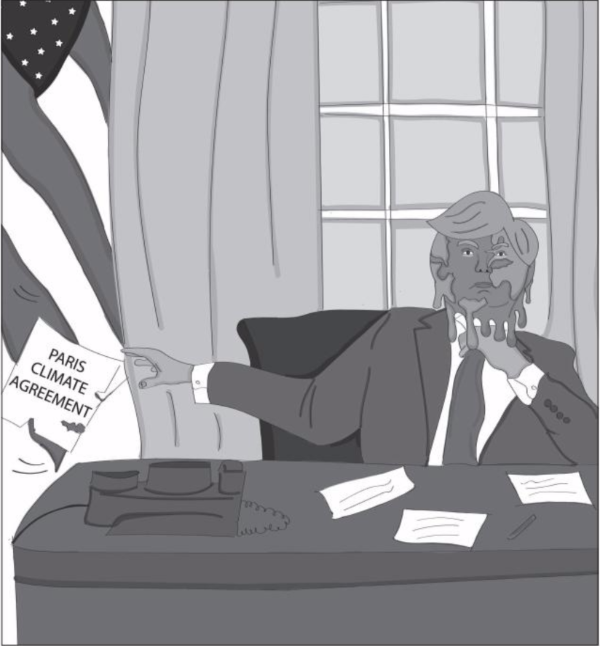Trump’s Withdrawal from Paris Accord Puts U.S. on Wrong Side of History
President Trump has officially declared the United States’ intent to withdraw from the Paris climate agreement, dealing another blow to the Obama Administration’s legacy and to an international community that is by-and-large in support of sweeping climate change solutions.
The Paris Accord is the landmark agreement signed by 195 nations in December 2015. The goal of the agreement is to limit global warming by 3.6 degrees Fahrenheit relative to pre-industrial levels.
Climate scientists warn that any temperature increase beyond that “red line” could have disastrous consequences worldwide.
To reach that goal, global greenhouse gas emissions must be cut 40 percent to 70 percent by mid-century and reduced to zero by 2100.
But with the United States’ withdrawal from the Paris Accord and our lack of executive commitment to greenhouse gas reduction, the 3.6-degree goal is unattainable. The United States is the second-leading country in emissions currently and is the leader in historical emissions, since the effects of carbon dioxide remain in the atmosphere for centuries.
We join the lonesome company of the only two other nations that failed to join: Nicaragua and Syria. Nicaragua abstained because it believes that the burdens placed on richer nations weren’t strong enough, and Syria refrained for what should be obvious reasons (Civil War).
President Trump, from a podium in the Rose Garden outside the White House, gave a disjointed and sometimes rambling speech detailing the logic behind his decision.
“I was elected to represent the citizens of Pittsburgh, not Paris,” Trump said. “As of today, the United States will cease all implementation of the nonbinding Paris accord and the draconian financial and economic burdens the agreement imposes on our country.”
His decision is a clear nod to the fossil fuel industry that lines the pockets of the Republican establishment as well as the coal workers who helped catapult Trump into the Oval Office.
There are two main issues with Trump’s logic regarding the “economic burdens” that this agreement potentially saddles our country with.
One, betting on short-term economic surge over long-term longevity will likely have devastating negative consequences for the future of our economy. Researchers from the University of California at Berkeley and Stanford University, in a paper titled “Global Non-linear Effect of Temperature on Economic Production,” estimate that U.S. gross domestic product (GDP) between 2016 and 2099 could be 36 percent lower if current climate trends continue.
Second, attempting to save the coal industry by backing away from climate regulations is a losing battle. The coal industry has been dying a natural death by market forces for decades. Natural gas is cleaner and cheaper, and the renewable energy market is surging to forefront.
In patented Trump style, he added that he would consider renegotiating the pact to make it more beneficial for Americans.
“We’re getting out,” Trump said, “but we will start to negotiate and we will see if we can make a deal that’s fair. If we can, that’s great. And if we can’t, that’s fine.”
But framing it as a business deal that can be negotiated is the wrong way to look at it.
The Accord isn’t a trade deal with winners and losers. It’s an acknowledgement by nations that climate change is real, the effects will be devastating, and that sacrifices must be made to mitigate the consequences that will be felt by all. It should come as no surprise that Trump can’t comprehend this, considering the man has to attempt to strong-arm his way through everything, even for an interaction as simple as a professional handshake with other world leaders.
That isn’t to say that the Paris Accord is perfect, though, and anyone who claims otherwise is wrong. There are legitimate criticisms that can be levied against the details of the pact.
One, it is non-binding, meaning there is no legal obligation by nations to commit to their promises. International shaming and a loss of negotiating power on the world stage serve as motivators. Two, the regulations are not quite strict enough. If the current emissions guidelines are followed, we will still miss the 3.6-degree mark.
But backing out of the agreement because it doesn’t do enough is like exiting a marathon because the first mile doesn’t get you to the finish line.
The Paris climate agreement is a starting point. It’s the first time an international framework has been agreed upon to address climate change, and it is a launchpad for further debate on how to move forward on the issue.
Despite the short-sightedness of our Executive Branch, there is reason for optimism. The momentum of the Paris Accord remains strong. Preeminent leaders from across the globe have reaffirmed their commitments, while hundreds of CEOs, mayors and governors from here in the U.S. — including our own Jerry Brown — have pledged to pick up the slack in reducing greenhouse gas emissions.
Furthermore, the withdrawal process from the Paris Accord is a years-long process. Many experts suggest the earliest we can exit would be after 2020 — when Trump is potentially out of office. And if the thick smoke billowing out of the Trump Administration in regards to the Russian investigation is any indication, we could have someone more receptive to climate change solutions in office sooner than the 2020 mark.
In the meantime, the best we can do is hope that our reputation on the world stage isn’t damaged further. Our leadership is drunk on “superpower arrogance,” where our actions have no negative consequences and the relationships with our allies deserve little respect.
This “America First” attitude on climate change is a dangerous road to travel, where the destination is history’s wrong side, and it’s awfully lonely being on the wrong side of history.

Ken Allard is a Los Angeles native and is in his fourth year at Glendale Community College. He enjoys covering hard news, politics, feature stories, sports,...

